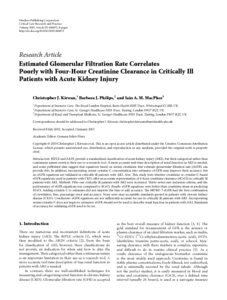Kirwan, CJ; Philips, BJ; Macphee, IA
(2013)
Estimated glomerular filtration rate correlates poorly with four-hour creatinine clearance in critically ill patients with acute kidney injury.
Critical Care Research and Practice, 2013 (406075).
ISSN 2090-1313
https://doi.org/10.1155/2013/406075
SGUL Authors: MacPhee, Iain Angus MacGregor Philips, Barbara
![[img]](https://openaccess.sgul.ac.uk/101421/1.hassmallThumbnailVersion/CCRP2013-406075.pdf)  Preview |
|
["document_typename_application/pdf; charset=binary" not defined]
Published Version
Download (620kB)
| Preview
|
Abstract
Introduction. RIFLE and AKIN provide a standardised classification of acute kidney injury (AKI), but their categorical rather than continuous nature restricts their use to a research tool. A more accurate real-time description of renal function in AKI is needed, and some published data suggest that equations based on serum creatinine that estimate glomerular filtration rate (eGFR) can provide this. In addition, incorporating serum cystatin C concentration into estimates of GFR may improve their accuracy, but no eGFR equations are validated in critically ill patients with AKI. Aim. This study tests whether creatinine or cystatin-C-based eGFR equations, used in patients with CKD, offer an accurate representation of 4-hour creatinine clearance (4CrCl) in critically ill patients with AKI. Methods. Fifty-one critically ill patients with AKI were recruited. Thirty-seven met inclusion criteria, and the performance of eGFR equations was compared to 4CrCl. Results. eGFR equations were better than creatinine alone at predicting 4CrCl. Adding cystatin C to estimates did not improve the bias or add accuracy. The MDRD 7 eGFR had the best combination of correlation, bias, percentage error and accuracy. None were near acceptable standards quoted in patients with chronic kidney disease (CKD). Conclusions. eGFR equations are not sufficiently accurate for use in critically ill patients with AKI. Incorporating serum cystatin C does not improve estimates. eGFR should not be used to describe renal function in patients with AKI. Standards of accuracy for validating eGFR need to be set.
Statistics
Item downloaded times since 03 Jul 2013.
Actions (login required)
 |
Edit Item |




